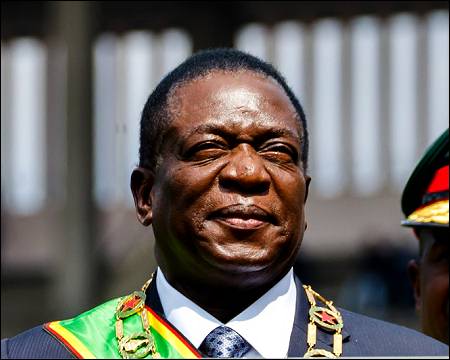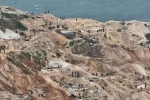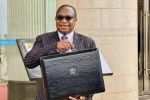By Admore Marambanyika
“My Days to Rest Are Fast Approaching”: President Emmerson Mnangagwa Announced Retirement Plan for 2028, Dispels Rumours of Extending Presidential Term, but the big question is; WILL HE STICK TO HIS WORD?
In a move to dispel swelling speculation that he intends to run for a third term in office, Mnangagwa has declared that he will step down in 2028.
Speaking at the commissioning of the Mutare Teachers College Fruit Juice and Water Processing Plant in Mutare, Mnangagwa declared his commitment to observing the constitutional term limits set by the constitution and his party, Zanu-PF.
Addressing the crowd, President Emmerson Mnangagwa officially announced his intention to step down in 2028.
“Our Constitution (Zanu-PF) says after every five years we go to Congress. There, we choose a President who is supposed to lead for two terms of five years each. I have done my first five years and we went to Congress and I was re-elected to lead for another five years. So, this is my last five years, which will end soon, and then I go and rest. My days to rest are fast approaching…..We will go to Congress and find another leader who will follow in my footsteps, the footsteps of Munhumutapa,” he said.
Mnangagwa has been on the spotlight as some high ranking government officials and some Zanu-PF sections have been on a crusade campaigning for him to go for a third term. Speculation that Mnangagwa wanted to extend his term beyond the constitutionally mandated two terms went viral following his earlier chant that, “2030 ndinenge ndichipo,” which translates to “I will still be there in 2030.” This sparked concerns that he might seek to amend the country’s Constitution or gain parliamentary approval to de-harmonize elections and defer presidential elections until 2030.
Ruling party activists have already coined the catchphrase “2030 vaMnangagwa vanenge vachipo” (In 2030, Mnangagwa will still be in power).
Some Zanu-PF leaders, including Vice President Kembo Mohadi, have chanted the slogan. Other party heavyweights who echoed the same include Masvingo provincial chairperson Robson Mavhenyengwa, regional minister Ezra Chadzamira and the party’s local Youth League called for the extension of Mnangagwa’s term at a National Youth Day event in the southern city.
Chadzamira said, “We all want you (Mnangagwa) to stay in office beyond your presidential term. You will be there in 2030,” to which Mnangagwa said; “I don’t have the power to say so as this matter is in the hands of God.”
For any constitutional changes, the country needs to hold a referendum after a motion has been initiated in parliament. In terms of Section 91 a President cannot serve more than two terms in office, so long as each of those terms lasts three or more years.
The presidential term can, however, be extended beyond the two terms through triggering a constitutional amendment of Section 91(2). Section 328(5) of the Constitution provides that a Bill to amend the Constitution must be passed by a two-thirds majority of the National Assembly and the Senate before it becomes law. In addition, if a Bill seeks to amend the declaration of rights or Chapter 16 (which relates to Agricultural land) it must be approved through a national referendum before it can become law.
Section 91(2) is not part of the declaration of rights nor does it fall within Chapter 16 of the Constitution so it can be amended by a two-thirds majority of both houses of Parliament to expunge the presidential limits.
An amendment to a term limit provision which has the effect of extending the length of time that a person can hold in a public office such as presidency does not apply to anyone who held that office, or an equivalent office before the amendment. This means that even if two-thirds of the Members of Parliament were to pass a Bill extending or revoking the term limits imposed by section 91(2) of the Constitution the Bill would not allow the current President to stand for a third term in office.
The amendment will not benefit the President but his successor. This provision is carried under Section 328(7) which reads: “Notwithstanding any other provision of this section, an amendment to a term limit provision, the effect of which is to extend the length of time that a person may hold or occupy any public office, does not apply in relation to any person who held or occupied that office, or an equivalent office, at any time before the amendment.”
To further provide safeguards against presidential term limit extension, the drafters of the new charter came up with a provision stipulating that Section 328 could itself only be amended through a referendum [see Section 328(9)]. Hence to achieve the extension of the presidential term, an amendment of section 328(7) will have to be done before amending Section 91(2).
Constitutional law expert, Professor Lovemore Madhuku, said a third term for Mnangagwa will be tragic for Zimbabwe.
“This idea of a third term is totally undemocratic and ought not to be pursued ... A person is better off in the first 10 years if they are lucky to be in office twice but to just think of a third term it would be to be very retrogressive in our country because we used to have a constitution that didn’t limit the number of terms that a person could serve as a president,” said Madhuku.
Southern Africa programme head at the Institute for Security Studies (ISS) Pius Pigou told the media that Mnangagwa’s comments were important in that they were clearing the air and upholding constitutionalism.
“The President has now made it clear these are the rules, both, in terms of the party’s constitution and the country’s Constitution. But these issues are rarely as straightforward as they might seem. If Mnangagwa has said he has no interest in a third term and the rules say no to that, anyway, then it is over, the issue can be parked. But, if he says they will follow the rules and says nothing about his own interests, he may still allow others to motivate for a change of the rules and continue with the choreographed noise like we witnessed last year. It’s highly unlikely the President will articulate his own desires,” he said.
The Crisis in Zimbabwe Coalition (CiZC) also added its voice criticizing the plot to amend the Constitution in order to facilitate Mnangagwa's bid for a third term, labelling the effort as illegal. The coalition said these manoeuvres would not only violate constitutional norms but also undermine the strides made in constitutionalism within Zimbabwe.
Another Political analyst Ruben Mbofana said Mnangagwa’s announcement could also point to some serious internal squabbles within Zanu PF adding that the man canot be trusted on his word alone.
“That’s a shocker. But a most welcome announcement as it finally shows the respect of the country’s Constitution, which has sadly been missing in our country, especially at the hands of the ruling elite. We know that the man cannot really be trusted. This may as well be nothing more than an attempt at cooling down temperatures within his own Zanu PF party by giving a false sense of comfort. It is now clear that Mnangagwa is not only surrounded by criminals, but has also become a huge liability to Zanu PF. The recent panicked threat by the regime against any potential protesters was quite unsettling. It’s quite possible that this unexpected announcement was in an attempt to placate internal dissent or even a promise he made to Chiwenga to avoid a coup,” he told the media.
Temperatures were alleged to be rising within Zanu PF over the third term bid with the faction linked to Vice President Constantino Chiwenga is said to be against the third term bid and working round the clock to stop it.
Some factions of the Zimbabwe National Liberation War Veterans Association (ZNLWVA) expressed their displeasure to the third term bid. Speaking during press conference earlier this year in Bulawayo, ZNLWVA national chairperson, Andrease Ethan Mathibela, vowed that the former freedom fighters would block any move to extend Mnangagwa’s term of office beyond 2028.








Leave a comment